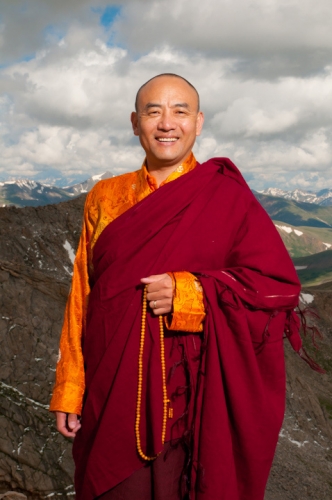
Today’s guest post on the four essential steps to dying with confidence comes from Chris Lemig, a student of Anyen Rinpoche’s.
A while back my teacher, Anyen Rinpoche, came down to Colorado Springs to give a talk on his latest book, Dying With Confidence. I’m not going to lie, I was really excited and even a little bit proud to be even a small help in organizing that event. But then, as he began his talk to about fifteen attendees, I dropped my ego clinging like a hot potato. This was serious stuff.
Dying With Confidence is not your typical spiritual self help book. There is no sugar coating, no coddling of any egos, no feel-good platitudes to be found anywhere in its 170 pages. Though it is written with great kindness and compassion, Rinpoche does not pull any punches. He dives right into a subject which we in the west have little understanding, one that we often times push out of sight or even outright deny: the inevitability of our own deaths.
Accepting that essential truth of our lives is the first step towards developing our confidence. When we become familiar and comfortable with the idea of death it ceases to rule us with fear. Once we have cultivated that familiarity, a process that continues throughout our lives, we can then begin to work on our spiritual practice as a means to “die with confidence.”
Rinpoche breaks this down into four essential steps.
First, he stresses that in order to have a solid spiritual practice we must have a Dharma Vision, a clear idea of what kind of practitioner we want to be at the time of death. It is important that we know where we are going on our spiritual path. To be stable and fearless at the time of death is the goal that Rinpoche suggests we shoot for. The only way we can do this is through slow, steady practice over the course of many years. This takes some degree of commitment on our parts and a willingness to take up one path, whether it be one of the schools of Buddhism or some other spiritual tradition.
Second, Rinpoche recommends we create a Dharma Will, an actual document that details our final wishes. This can include an explanation of our basic spiritual beliefs as well as instructions for life-support, medication, donating the body and how to contact our spiritual teachers. This will be especially helpful to family and friends who may know nothing about our spiritual beliefs.
Third, we should work on developing a good relationship not only with a qualified spiritual teacher but also with a group of what Rinpoche calls Entrusted Dharma Friends. These are people who we have practiced with, ideally for many years, who will know what to do at the time of death. They, along with our spiritual friend, will be able to support us as we die, helping us to do our final practices as well as assure our loved ones that they need not worry about our spiritual well-being.
Finally, we should create a Dharma Box, a physical container that holds all of the things our Dharma friends will need to help us through our transition. This box can contain pictures of our teachers, special prayers for the time of death, teachings that were particularly important to us and ritual items. We can let our Dharma friends know where this box will be kept in advance.
I know, this all sounds pretty strange, but even if you’re not a Buddhist, you can take some time to think about these kinds of things. Think about what your family would do if you were to suddenly pass away. What if they had no idea what your final wishes were?
It only takes a little bit of preparation to put together a package of your thoughts and feelings about what you would like to happen at the end of your life. When you’re done, have a discussion with your loved ones about it. This takes some courage, but I think that if we talk honestly about death it will not only give us confidence when we do eventually die, but it will help us live our lives with more meaning as well.